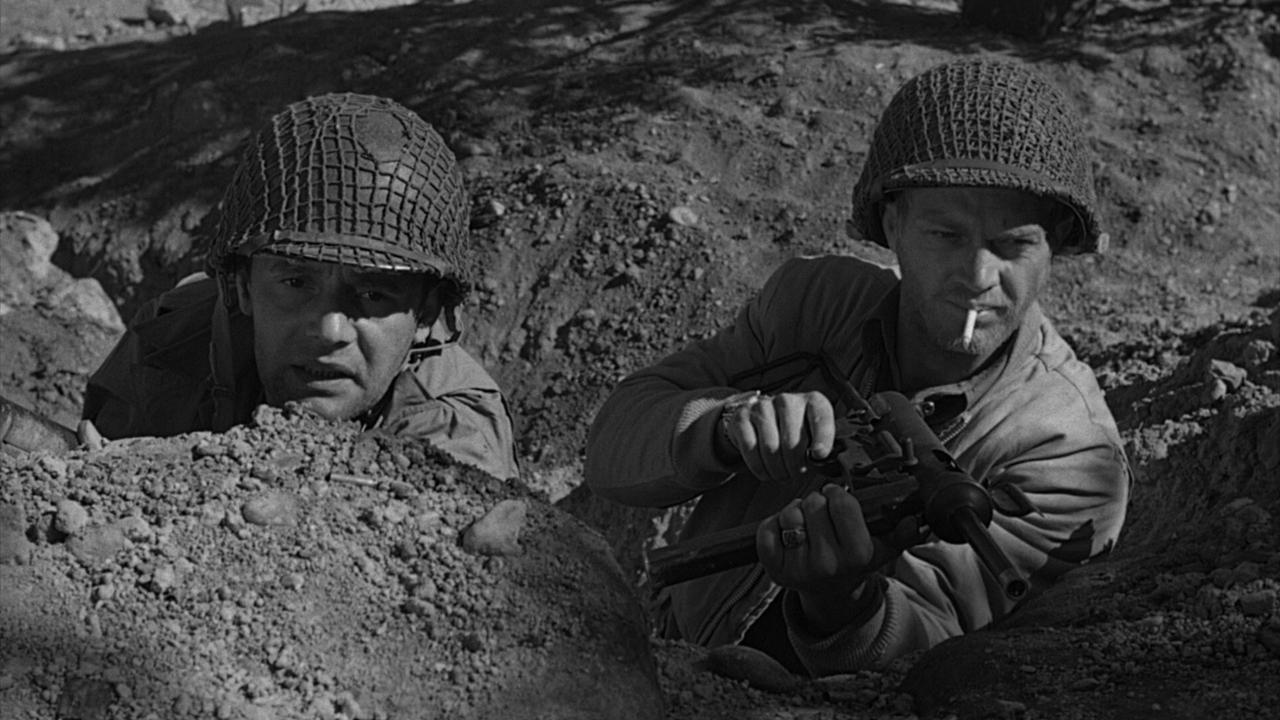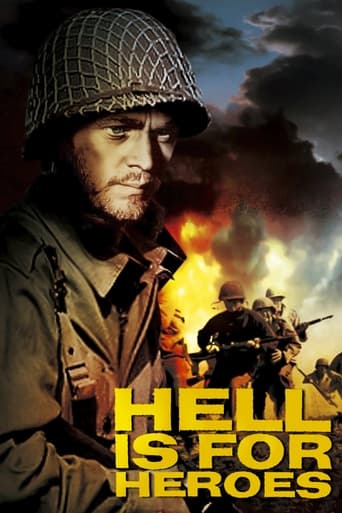



Clever and entertaining enough to recommend even to members of the 1%
View MoreI wanted to like it more than I actually did... But much of the humor totally escaped me and I walked out only mildly impressed.
View MoreIt is a whirlwind of delight --- attractive actors, stunning couture, spectacular sets and outrageous parties.
View MoreThere's a more than satisfactory amount of boom-boom in the movie's trim running time.
View MoreGreat WW2 drama. Solid, gritty plot, and fairly accurate, militarily. Great direction by Don Siegel - characters are developed well, the story builds at a decent pace and flows well. No excess scenes.Solid performances all round. Steve McQueen, whose movie career was still fairly young at the time, displays the cool character that would become his trademark. Also features James Coburn in one of his earliest movie roles (though he had appeared in many TV series by then) and Bob Newhart in his very first movie role.
View MoreWhereas producer-director sounds like a far-off call from lab and second unit labor at Warner Bros., Siegel internalized that hard-line technical work's effective discipline by the time more modern audiences began seeking more realism and grittier attitudes in movies. His shrewd and thrifty technique at the helm squeezed full advantage of his creative power. And this brutal, and yet so unassuming, 1962 war picture can be seen to illustrate the traditionally altering function of the director in American movies. As Siegel's repertoire developed as a workmanlike director of drum-tight action films, industrially skillful but divulging little of himself, he began to embrace a more open style in which he made the best of his actors' capabilities with presence and behavior. Point to Harry Callahan and Charley Varrick for characters who have whip up some argument simultaneously while delivering the full-tilt gratifications required of testosterone-driven action thrillers, but point to Hell is for Heroes for an early example of Siegel's ability to juggle various wholly sympathetic and entertaining characterizations in what feels like a leisurely way throughout the backdrop of a taut, spare combat picture.Bobby Darin is one of those who you can constantly forget he's a particularly good actor, and not just a serviceable one. It's not that musicians can't be good actors. It's that Darin was so dedicated to his music. Darin wasn't just at crooner. He did pop, rock, jazz, folk and country. His health was treacherously weak and this induced him to thrive within the incomplete life span he was terrified he would, and finally did, have. Roughly around the same time as he brought a lifelike suggestion to his character in John Cassavetes' forgotten Too Late Blues from his immersion in the day's music scene, he fit so comfortably into the skin of a con man, peddler and thief. He stays strongly consistent as an operator who can't sit still, always determined to peddle his countless devices. This includes peddling literally at the start, but he's a street kid with ears forever to the ground and his fingers on the pulse of what's going on, and Darin credibly use this nature in whichever manner he must in situations ranging in such close succession as dodging mortar in the trench and teaching Bob Newhart's army company clerk who suddenly and mistakenly arrives at the squad post.Newhart is a surprise treat because his supporting role is all farce, surrounded by hard-boiled brutality and yet bringing an early Woody Allen or Albert Brooks type to life. Siegel often seemed to sprinkle a broad comic relief stereotype into a vicious action mix, usually to the chagrin of the macho men at the center of it all, as is the case here as well. Newhart is a surprise treat and he's effective, but think of how his sort of light-hearted formula concession would've fatally diffused the ultimate tensile strength of The Hill, another less well-remembered 1960s war film in uncompromising black-and-white. As the ragtag male team does here, the characters in The Hill are entrapped in the punishing confines of a survival-of-the-fittest war situation. In that case, it was a British army prison in sweltering North Africa. The closest it came to caricature was the self-conscious aping in the brilliant nervous breakdown of a young Ossie Davis' with the added trouble of being black.That said, regardless, I still think Hell is for Heroes is worthy of significant mention on the subject of early Hollywood realism, and at the same time, I understand how oppressive it would've been if everyone in Hell is for Heroes were like Steve McQueen's difficult outsider Reese or James Coburn's mechanically gifted corporal. Variety is important and Siegel always provides it with rich characters even in his lesser films. Hell is for Heroes may not be tense or throttling in a way comparable to other realist '60s war films, but its characters are particularly memorable. Always a charismatic but hard-shelled actor, McQueen gives a compelling early portrayal of what might be an early example in modern history of the "war addict" personality studied in most state-of-the-art war films like The Hurt Locker. Reese manages to push away practically everyone in the squad right from the start. The company commander is troubled because Reese becomes when there is no fighting, but he's a good soldier in combat He lives and breathes confrontation with potentially fatal threats the way a drug addict is never satisfied with more than enough of their substance. And he's like that in the field as well.
View MoreThis keen little B movie must have packed quite a punch back in the early 60s, but in the wake of the likes of Saving Private Ryan it looks a lot tamer than it must have done back then. An intense and moody Steve McQueen (both on and off screen, apparently) is Reese, a maverick soldier assigned to a small group of soldiers landed with the unenviable task of defending a hill against a platoon (or troop or squad or battalion – more than the 6 men the Yanks had, anyway) of Germans during WWII. The soldiers employ a number of 'Home Alone' style tactics in order to fool Jerry into believing they number in the hundreds before finally mounting an attack on a seemingly impenetrable pill box, the residents of which are systematically gunning our heroes down.Hell is for Heroes follows many of the genre stereotypes, a fact which weakens its overall impact simply because it's all a bit too familiar. You have the surly loner (McQueen), the wily gopher (Bobby Darin), the stoic leader (Fess Parker), the ever-so-slightly remote but highly intelligent soldier (James Coburn), the enthusiastic partisan (Nick Adams) etc. These all interact in pretty much the way you'd expect, and because the story has to find room for two comic characters (Darin and stand-up comic Bob Newhart as a nervous typist who strays into the battle arena) the film has a fairly uneven tone. This ensemble approach means the character of Reese - ostensibly the lead - is too often sidelined so that others get their moment on screen, and we learn little about him other than the fact that he's a moody bugger.Having said that, the film contains some undeniably powerful moments. Not only the climactic scene, an accident of financial shortcomings which has subsequently earned the film an apparent cult status, but also the death scene of Private Kolinsky (Mike Kellin), filmed from above and screaming with a terrifying intensity while claustrophobically surrounded by his comrades as he's stretchered to safety. It's concise, anti-war scenes like these – and not the misguided comic moments – that give the film its impact and give it the right to lay some claim to the status it has received.
View MoreOne of Steve McQueen's better roles is one that is modeled on one that James Cagney played in The Fighting 69th. If you'll remember Cagney was a wise guy who lost his nerve on the battlefield and was sentenced to be shot, but redeemed himself in a heroic climax.Now McQueen wasn't a coward and he didn't have a priest like Pat O'Brien to have faith in him. But he was a reckless sort and convinced of his own righteousness. It negated his acts of bravery and when the film opens we find him down to being a private and under the command of a sergeant played by Fess Parker who likes him, but understands him all too well.And Parker's platoon has a really rotten assignment. Hold their position on the Siegfried Line with a handful of men until help arrives and maybe convince the Germans there's a lot more out there than there really are. McQueen in his usual rebel way goes his own way. It costs the lives of a lot in his squad. Still he does redeem himself like Cagney in the end. This is maybe the only film in which McQueen's rebel persona worked against his character. Still it's an interesting and moving performance he gives.Look also for good performances from the rest of the cast that includes Harry Guardino, Bobby Darin, Nick Adams, Mike Kellin, and Bob Newhart as other soldiers on the dirty detail.The film credits say 'introducing Bob Newhart' and he provides what little comedy there is. After the Parker platoon gets the assignment to hold on their assigned piece of real estate, Newhart comes driving up in a jeep loaded with typewriters. He's a clerk/typist at division headquarters and it seems as though he made a wrong turn. Never mind because Guardino and Parker commandeer him and his jeep.Which sets up one of his routines from his early standup act. Newhart used to work with a telephone and he's asked to do so here for the benefit of a German microphone planted on the American line. It actually works very well into the fabric of the plot.Hell is for Heroes is one tough and gritty war drama, the kind of film that a generation later, Steven Spielberg would get all kinds of acclaim for Saving Private Ryan. For war picture fans, this is a must.
View More